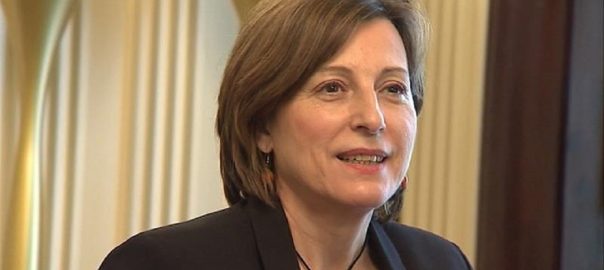22.11.2016 - 15:18
|
Actualització: 22.11.2016 - 16:18
Carme Forcadell, the President of the Parliament, will have to testify before the court on the 16th of December for allowing the pro-independence roadmap to be put to vote on the 27th of July. Catalonia’s Supreme Court (TSJC) notified her of this on Tuesday and has also called three other member of the Parliament’s Bureau to testify as witnesses. Thus, Spanish Unionist ‘Ciutadans’ MP and second Vice-president of the Parliament’s Bureau, José María Espejo has also been required by the Court, together with the Bureau’s second secretary, David Pérez, from the Catalan Socialist Party (PSC) and the Bureau’s third secretary, Joan Josep Nuet, from alternative left alliance ‘Catalunya Sí que es Pot’.
The notice arrived less than a week after the TSJC refused Forcadell’s appeal and decided to proceed with the investigation. According to the interlocutory order, written by Judge Maria Eugènia Alegret, the case against Forcadell was not opened ‘due to any debate of ideas’ nor attempts to curtail Forcadell’s freedom of speech but rather has to do with ‘disobeying’ a Spanish Constitutional Court (TC) ruling and allowing the conclusions of the committee to study the constitutive process to be assessed. The document insists that the TC ‘constitutes a key piece in the architecture of democratic and advanced states’.
According to Alegret, Forcadell’s freedom of speech is guaranteed by the European Constitution for her to be allowed exercise this right ‘without any obstacle’, as well as the rest of her fundamental rights. However, it nuanced that in public affairs ‘it can only be exercised within the legal form established in each case’. The interlocutory order also stated that for the lawsuit to proceed ‘the facts described, to be proved truthful, should point to a criminal nature’. ‘It is needless to say that, regardless of the hints, that the facts described in the lawsuit are plausible’ continues Alegret, but calls for the Parliament to ‘add elements to the inquiry’ in order to ‘prove’ whether the facts described constitute a crime, and also in ‘defence of the interests of the accused’.
Amongst these documents, the TSJC requested the Parliament’s pro-independence proposal, agreed on the 9th of November 2015 and all the resolutions which were passed in order to allow the pro-independence roadmap to be put to vote in July 2016.


